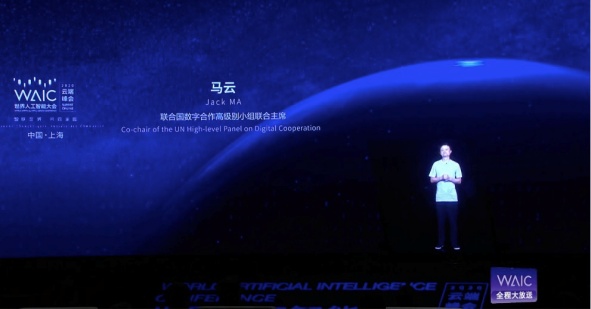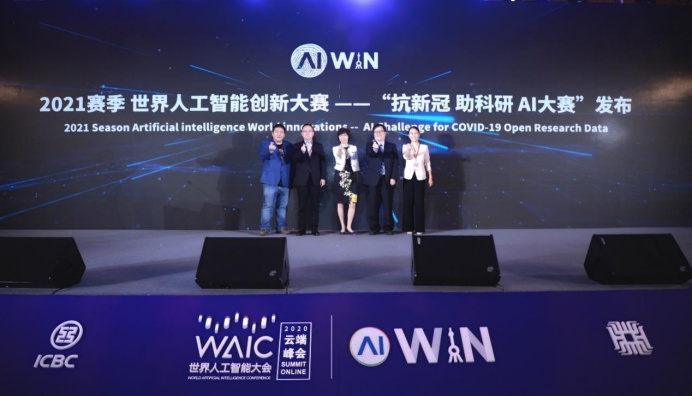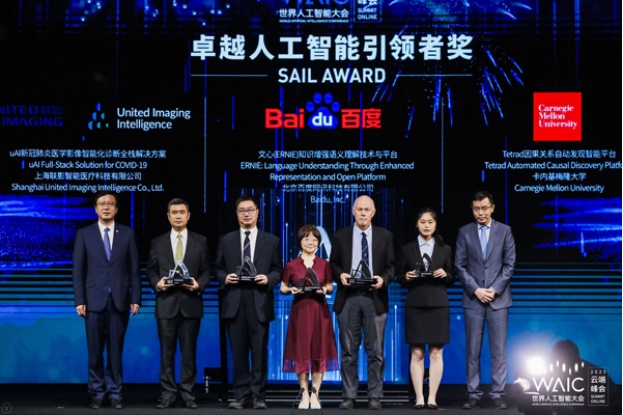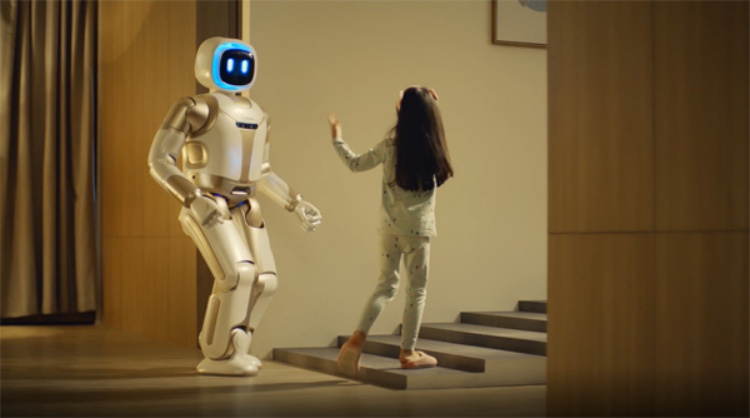
The 3rd Shanghai World Artificial Intelligence Conference Cloud Summit, which ended on July 11, shoulders the mission of contributing "China’s solution" to artificial intelligence, and has become a wind vane for the development of the global artificial intelligence industry. In the face of an industry that is more unknown than known, what is the current situation of the artificial intelligence industry? What will it look like in the future? Dajiandong Studio interviewed the big coffee and enterprises who entered the venue to listen to their answers.
AI has worked its magic in a wide range of fields, and the "Shanghai sample" shows sharp corners

Ma Yun, who is giving a cloud speech with a hologram.
The epidemic is not over yet, and this conference is still full of big coffee. According to the statistics of the conference, more than 550 heavy guests gathered in the cloud, including 7 Turing Award winners, 1 Nobel Prize winner, and 62 top Chinese and foreign academicians. They analyze the artificial intelligence industry from different perspectives.
Baidu founder, chairperson and CEO Robin Li’s on-site speech said that at present, a few general AI platforms and some sub-AI platforms focusing on a certain vertical industry have emerged globally. In the vertical industries of information search, information flow recommendation, and driverless driving, artificial intelligence has proved or initially proved its potential for subversion and reconstruction of the industry.
Huawei director and CIO Tao Jingwen believes that the fourth industrial revolution has arrived, which contains huge digital opportunities. 5G + AI + cloud + industrial Internet, multi-technology integration drives industrial transformation, and human beings are accelerating into the intelligent world where everything is connected.
In the video connection, Tesla CEO Musk is very confident about the future realization of Level 5 autonomous driving. "I think it will be achieved soon, and we are confident that we will complete the basic functions of Level 5 this year."
"For example, Baidu’s autonomous driving; Ali’s city brain intelligent transportation; Tencent’s medical reading and medical image data processing; iFLYTEK’s automatic speech recognition; Cambrian, iFLYTEK, and SenseTime Technology as the representatives of start-ups in technology innovation; Hikvision occupies the first place in the global intelligent security enterprise…" Jiang Changjun, vice president of Tongji University and convener of the Shanghai artificial intelligence strategy consulting expert committee, listed them one by one, arguing that China’s artificial intelligence field, especially the intelligent industrialization application, has taken the lead in the world.
Miao Wei, Minister of MIIT, said bluntly that on the whole, the development momentum of our country’s artificial intelligence industry is good, technological innovation is increasingly active, the industrial scale continues to grow, and the application of integration with the industry continues to deepen, and the development prospect is promising.
At present, Shanghai has gathered more than 1100 key enterprises in the industry, and the output value of the artificial intelligence industry exceeds 140 billion yuan. It has gathered 100,000 industrial talents and become one of the leading regions in the development of artificial intelligence in the country.
"Statistics show that in terms of the number of AI companies, Shanghai ranks among the top in the world." Wang Yingchun, director of the Science and Technology and Society Research Office of the Shanghai Institute of Science, believes that Shanghai has taken the lead in fulfilling the mission of "pioneering a new path and model for the development of artificial intelligence", hoping to form a "Shanghai experience" and promote it nationwide.
AI in the epidemic, deep empowerment into a new trend in the industry

In the actual combat of AI, we have to mention the COVID-19 epidemic. The new round of industrial transformation force represented by artificial intelligence has highlighted "smart responsibility" in various aspects such as disease diagnosis, screening and follow-up, drug research and development, logistics and distribution.
Image detection is an important basis and means for the diagnosis and treatment of COVID-19. The "uAI COVID-19 Intelligent Assisted Analysis System" developed by United Imaging, an artificial intelligence subsidiary of United Imaging Group, is the industry’s first AI full-process solution that integrates the overall and partial image characteristics of pneumonia and accurately triages pneumonia images.
In the face of the explosive demand for medical treatment, artificial intelligence assisted diagnosis system comes into play. Shanghai Yitu Technology launched the "COVID-19 intelligent evaluation system" based on artificial intelligence technology, carried out rapid diagnosis and intelligent analysis of curative effect, and launched it in the Shanghai Public Health Center. The evaluation results of more than 70 cases of COVID-19 have been preliminarily verified, showing that the evaluation results of the system are highly consistent with the evaluation of experts.
In the epidemic, as the first wall of intelligent early warning monitoring, the fire-eyed infrared thermometer independently developed by Shanghai Zero Carbon Technology Company can simultaneously monitor up to 100 targets in a unit area, and distinguish the temperature of each individual through an infrared detector with an accuracy of 0.1 degrees, which greatly shortens the measurement time.
In addition, UKED’s safe house technology provides support for information investigation of personnel in epidemic key regions; Yunzhisheng has launched "epidemic prevention and control robots", which has effectively helped grassroots street communities to carry out health tracking and flow investigation; small i robots use automatic speech recognition, semantic understanding and other technologies to carry out voice interaction, providing free epidemic prevention robot services to the community…
The actual combat of AI in the epidemic highlights the new trend of AI deeply empowering the industry. Ge Yue, global vice president of Apple, exclaimed, "The epidemic has shown us the power of technology."
"Artificial intelligence is a magic card in our hands." Chen Liming, chairperson of IBM Greater China Group, said that embracing new digital technologies represented by artificial intelligence and cloud computing will help enterprises reduce or even resolve the impact of unforeseen events such as major epidemics.
Basic research is still a shortcoming, and an influential ecosystem has not yet been formed

The artificial intelligence industry has made great progress, but it is still in its infancy and there are still many shortcomings.
Ge Junbo, an academician at the Chinese Academy of Sciences and head of the cardiology department at Sun Yat-sen Hospital affiliated to Fudan University, believes that the application of artificial intelligence in reality has not been perfect so far. Medical big data is still "big and messy" because of the lack of data governance standards. "What artificial intelligence needs is accurate data. It can provide a diagnosis through learning, sometimes more accurate than a doctor. The premise is that the data you give it must be accurate."
"Technology is very useful, but it is only a tool. It can be fully utilized in technology applications in the future, but you cannot be superstitious about technology." Zhang Wenhong, director of the infectious disease department of Huashan Hospital affiliated to Fudan University, said that there are still many obstacles to the clinical application of big data.
He pointed out that when there are unexpected situations in big data, reliable doctors can rely on their own logic to continuously generate new data. Although artificial intelligence can continuously learn and make new judgments at every stage, medical care is not a game of Go. Artificial intelligence cannot generate new data here, but also relies on people.
Similarly, Liu Qingfeng, chairperson of iFLYTEK, said that the development of artificial intelligence today is by no means as long as there is data or as long as the data can be used to solve the problem.
How to use less data to achieve better results and make data self-driven more effective; how to solve multilingual problems; how to solve privacy problems; how to solve emotional humanization problems… In his opinion, artificial intelligence still has a lot of core technology innovation, which is a real need for source technology innovation and strong technology field.
Jiang Changjun said frankly that the current artificial intelligence industry in our country has not yet formed an influential ecosystem and industrial chain. Compared with the United States and Europe, it is more focused on application landing, and the development of basic theories and original algorithms is weak, and there is a lack of breakthrough and landmark research results. The development of common technology platforms and smart chips is relatively weak.
"We need to further raise awareness, focus on the future, increase research efforts, make up for technical shortcomings, establish an industrial ecology, and seize the commanding heights of the industry."
It is gratifying to note that currently, leading Internet companies have realized that establishing an industrial ecosystem through open-source technology is an important means to seize the commanding heights of the industry. For example, Baidu’s PaddlePaddle, Tsinghua University’s Jittor, Megvii’s MegEngine, and Huawei’s MindSpore have all open-sourced their deep learning algorithms to master the underlying AI technology through independent research and development.
What is the potential of the artificial intelligence industry? The world will have a super 12 trillion market space

UBTECH Walker Robot
How will the artificial intelligence industry develop in the future?
"It is expected that by 2025, the ICT industry will have 5 trillion scale, the retail industry will be about 1.50 trillion scale, and the smart manufacturing 6.40 trillion scale." Tao Jingwen believes that with the application of artificial intelligence and big data, the world will have a market space of more than 12 trillion, which requires a more open attitude and cooperation.
"There is a saying in the field of artificial intelligence: there is as much artificial intelligence as there is artificial intelligence, and it refers to the learning curve that a technology needs to go through in the early development process. Some people call this the sowing season and the harvest season." Chen Liming, chairperson of IBM Greater China Group, said that with the passage of time, the accumulation of experience, the enrichment of algorithms and the increase of investment, artificial intelligence will also break through the early learning cost and accelerate the deployment in various industries. Perhaps 20 years later, many companies are AI companies in a sense.
"A few years ago, a city needed to do intelligent computing and needed more than a dozen cabinets; a year ago, this AI chip could already reduce the number of cabinets to one; in the next ten years, as long as it is shrunk a hundred times on a palm-sized chip, one hand can support the city management needed today." Yitu Zhulong said that the next ten years will be the super-Moore era of AI computing power.
Wang Xiaoqiu, President of SAIC Motor Group, realized that new-generation information technologies such as artificial intelligence, big data, and cloud computing are important engines driving technological revolution and industrial change. In the future, with the continuous maturity of 5G artificial intelligence and other technologies, it will surely promote the accelerated leap of the economy and society from networking to intelligence.
Liu Qingfeng, chairperson of iFLYTEK, said: "In the post-epidemic era, we have been promoted to the digital’survival era ‘. In the future, online and offline life will become the norm. Whether it is epidemic prevention and control, or future production and life, we will face a phased or long-term coexistence of online and offline digital survival. Artificial intelligence lights up the fireworks in the world, which is not only a very attractive and attractive picture in the future, but also a huge trend in the future that we will have to face."
With the rapid development of artificial intelligence, many people have also raised some concerns: Will AI replace our jobs?
Wang Yingchun, director of the Science and Technology and Society Research Office of the Shanghai Institute of Science, said, "Every profession is made up of different job content, and artificial intelligence replaces some of them, and eventually forms a working model in which humans and machines coexist harmoniously."
"In the next stage, AI will be ubiquitous and easier to apply. Traditional companies have the ability to hire their own AI engineers, just as every company has IT engineers today." Kai-Fu Lee, founder and CEO of Innovation Works, believes that AI + will continue to be valuable, but + AI is the bigger solution.
(All photos are provided by the organizers of the conference.)
关于作者